Job Hunting Nightmares: What Are Recruiters Doing Wrong?
Create Your Resume Now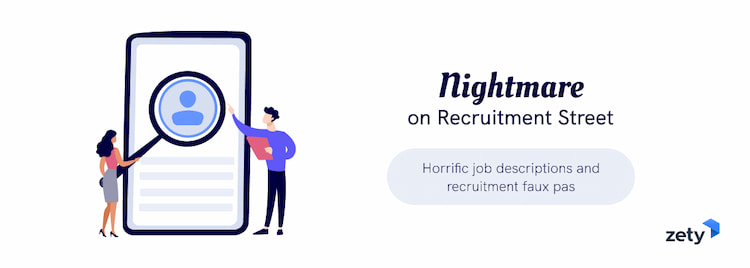
A tidal wave of more than 24 million American workers have quit their jobs since April 2021. Everyone’s perusing job ads these days during “The Great Resignation.”
Imagine you’re on the hunt, clicking through job ads and discover...
The. Perfect. Job.
It’s got your name written all over it. Your qualifications and education match. The location is…
Huh. It’s not there? That’s strange.
You think, “Okay, must be a remote position!” trying to stay positive. But, it’s not. You search the ad for the salary, holding out hope.
But, that’s not included either. Frustrated, you move on to the next job. What a waste of valuable time!
Some job ads and recruiters leave something to be desired. Zety conducted a study of 1000+ American employees to find out what they thought of job posts and recruitment situations. We even tested their sexist/ageist phrase-ometer.
Guess what, recruiters?
Nearly all of the respondents, 95%, said salary range should be included in job ads.
A couple of other highlights:
- 46% of women had a negative reaction to the word “Ninja” in a job ad.
- 56% of all respondents said dealing with a chatbot was annoying.
All in all, job seekers are becoming more selective as this survey showed. Read on to find out what else irked them.
Show me the money
Let’s be honest.
As Americans, we’re money-obsessed. We eat up stories about the wealthiest people and want to see what’s being served inside Elon Musk’s private jet, or rather spaceship.
A “fun company culture” may sound appealing. But when it comes down to it, money talks.
And much to job seekers’ chagrin, most job descriptions lack basic salary information.
Today’s job seeker is more savvy and fickle in this increasingly tight labor market. They want to see that salary range.
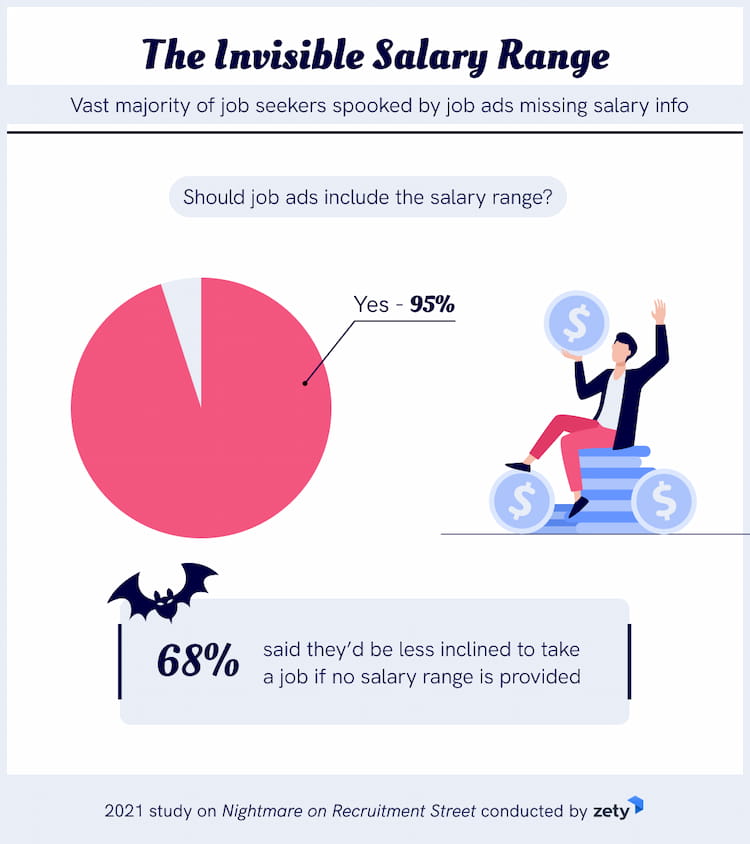
As can be seen in the infographic above, a whopping 95% want to see the salary information in a job advertisement.
How does this compare with other research on this topic?
According to a study published in The International Journal of Human Resource Management:
“The results are generally supportive of a positive effect of including... compensation and benefits in job advertisements on job pursuit intentions. Specifically, it is shown that increasingly specific reward information is associated with stronger perceptions of person-reward fit, and consequently, with higher intentions to pursue a position.”
In other words, job seekers feel more inclined to pursue a job if the job posting has specific details about salary and benefits.
That’s a pity since just a little more than 12% of global companies published a pay range within their job ads last year. That’s according to a 2021 report from a compensation data company called Payscale.
Although 12% might not sound like a lot, that’s up from a measly 8% in 2019.
The Society for Human Resource Management published data from Emsi Burning Glass which found that more employers are including salary in job posts. As organizations are forced to do even more to attract the best talent they’re being forced to change the old ways of thinking.
Salary information in job ads has increased notably for certain industries, especially the ones most affected by the pandemic:
- From 5% to 14% for restaurant host jobs
- From 4% to 11% for fast-food positions
- From 6% to 18% for nursing positions
- From 10% to 19% for the entertainment and recreation industry
It’s also worth mentioning the increase for management positions: from 6% to 10%. For front-line workers, it’s increased from 6% to 9%.
That said, the great majority still don’t include salary info.
LinkedIn also conducted a study of candidates across industries and career stages.
They asked those in the study to highlight sections of job posts they found useful, appealing, or would make them more likely to apply.
The results?
Salary range and benefits were by far the most highlighted portions of the job description.
For our study, the respondents were first asked if job posts should include the salary range, and 95% answered yes. It was followed up with a question to find out just how important it was to them.
- 42%—very important
- 34%—absolutely essential
- 18%—of average importance
- 3%—of little importance
- 2%—not at all important
From this, you can say that 94% of the respondents feel that it’s important to see the salary in job ads. This lines up with the 95% who answered yes to the first question.
A mere 5% considered seeing salary information unimportant.
The Colorado Department of Labor takes this kind of pay transparency for their residents seriously. As part of their aim to ensure equal pay, job seekers can see the pay offered in job posts. These Equal Pay Transparency rules took effect in January 2021.
Fortunate for Coloradans!
Because of the Colorado Equal Pay Transparency rules, employers have to post wage and benefit information for all job openings, including remote jobs.
The following information is required in Colorado job postings:
- The rate or range of compensation
- A description of any bonuses, commission, or other compensation
- Details on benefits including healthcare, retirement, and paid days off
- Information on benefits that must be reported for tax purposes
Well done, Colorado!
So, who cared the least about salary details in a job posting?
We asked the respondents how much they agreed or disagreed with the statement, “I’m less inclined to apply for a job if there’s no salary range included in the job ad.”
- 13% of those with a master’s or doctoral degree disagreed.
- 10% of those with an associate’s or bachelor’s degree disagreed.
- Just 7% of those with no college degree disagreed.
So, education was an important factor.
But there are other critical details when it comes to a job ad besides salary.
Location, location, location
The respondents were asked which details were critical for them to see in a job posting.
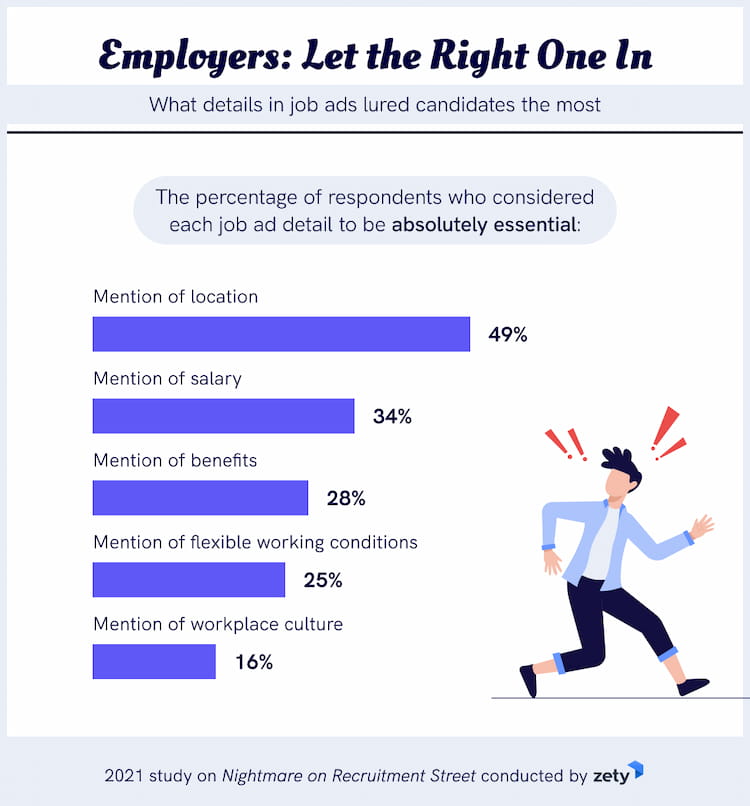
With many employees back to working onsite or with a hybrid system, where your job is located is a tad important.
Yes, that was sarcastic.
- For those with no college degree, seeing the location in a job post was absolutely essential for 66% compared to 44% of those with college degrees at any level.
- The location information was absolutely essential for 53% of females vs. 44% of males.
As mentioned earlier, a LinkedIn study asked 450 participants which parts of a job description mattered most.
Location was categorized under job details along with other specific information. This rated third in the study after compensation and qualifications. Commuting is a pain point, so job seekers take it into consideration when searching for a new role.
Location was key, but other details, not so much.
Culture schmulture
“Connected company culture that values fun and emphasizes flexibility.”
That type of company culture description is common in job posts these days. And what do respondents say to this?
Meh.
The survey participants didn’t gush about the importance of seeing the company culture in a job ad. Just 16% said it was absolutely essential to see this in a job post.
How does this compare to the LinkedIn study? According to their study, candidates “skim right past” descriptions of the workplace. A low percentage—28%—felt that company culture was important in a job post.
In a nutshell—
Candidates are searching for the details that drive their intention for changing jobs. That motivation is usually increased pay and better benefits.
Job seekers also react to the specific wording used to describe the ideal candidate.
Language lab—reactions to job ad phrasing
The original Scrabble board game box has three words printed on it:
“Every word counts!”
Indeed, every word and character counts in the world of job-ad creation. It’s best to not devote too much real estate to vague, superfluous, or cringe-worthy words.
We asked respondents their opinions on popular job ad buzzwords and clichés.
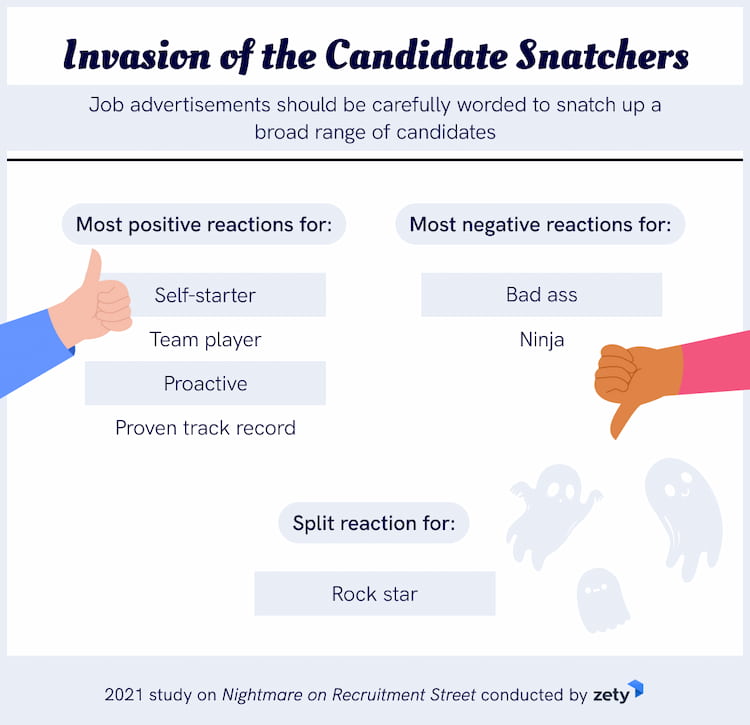
What words and phrases were no-nos for the survey participants and which ones did they view favorably?
The respondents could select positive, neutral, or negative for terms we gave them.
The most positive reactions came for:
- Self starter—55%
- Team player—55%
- Proactive—54%
- Proven track record—46%
The survey takers had positive and neutral responses to dynamic, genius, core competency, and champion.
Rock star. This was split as 36% positive and 34% negative. Authoritative was fairly even at 32% positive, 29% negative.
The survey takers weren’t keen on ninja and badass.
Ninja was negative for 42% and badass negative for 47%.
It’s clear that a casual job description can backfire. The LinkedIn study showed the same. They used phrases like, “kickass corporate manager” and found that the survey participants responded the least favorably to the casually worded job descriptions.
The LinkedIn study states:
“...distaste for the casual tone also carried over into what they thought of the company and whether they’d apply. Readers of the casual post were 4x more likely to view the employer negatively and 2–4x less likely to apply.”
And those casual words aren’t even the worst offenders. Some job posts can come across as sexist or ageist.
You’re not my stereotype
It’s nothing to be ashamed of.
Adjectives like dominant and competitive are associated with men and words like supportive and empathetic create an image in our mind of a woman.
The same holds true for words that have age associations. Digital native and new grads—obviously suggest youth. Mature and senior-level conjure up images of someone grey-haired.
We wanted to see if the participants in our study had the same impressions.
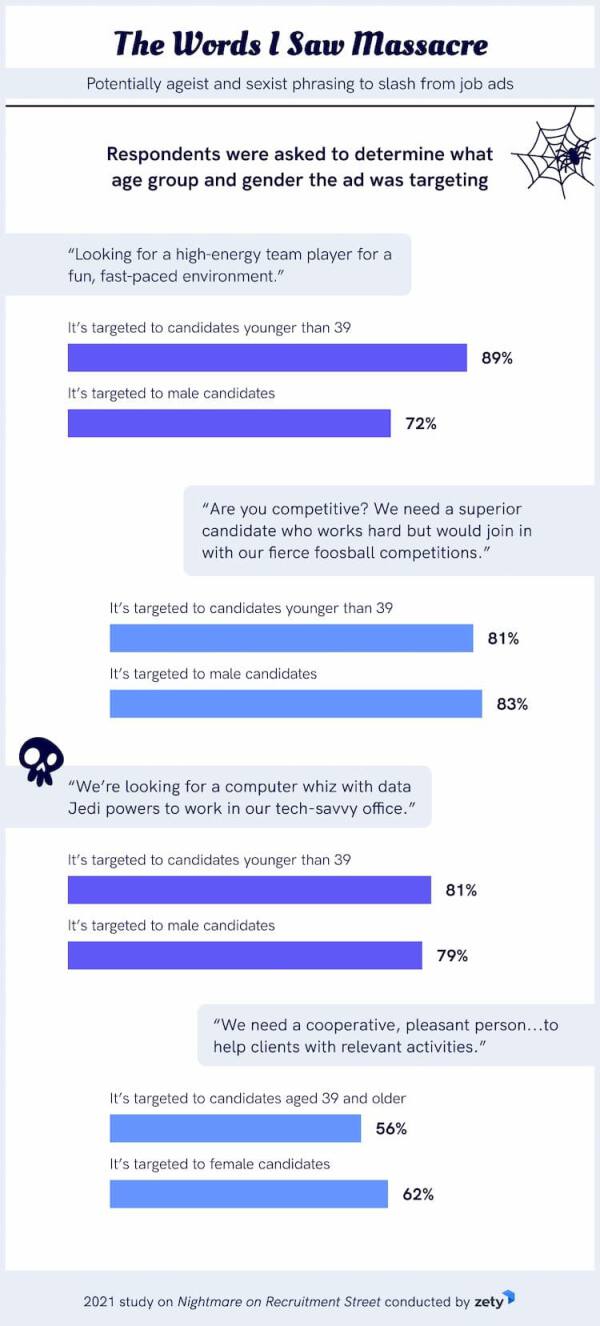
Respondents did a great job identifying what was implied in terms of age group and gender.
Some of the words in the fictitious job post lines above could be considered ageist and sexist, and therefore discriminatory.
Wording like high-energy, fast-paced, and tech-savvy all have the connotation of youth.
Competitive, Jedi, and superior create an image of a man. It’s unconscious bias, but that’s what springs to mind.
The same goes for cooperative, pleasant and help. We can’t help but think of a woman and/or an older person. The participants in the study had the same impression.
Whether they intend to exclude certain candidates or not, job ads should avoid wording that could be construed as ageist or sexist.
Opinions on the wording differed based on age and gender.
For example, in response to this wording: “high energy team player for a fun, fast-paced environment,” 67% of those under 39 felt positive about it vs. 54% of those 39+.
Another case in point:
“We’re looking for a computer whiz with Jedi powers to work in our tech-savvy office.”
- 43% of those under 39 had a positive reaction and 20% had a negative reaction
- 36% of those over 39 had a positive reaction and 29% had a negative reaction
And who do you think found the description below appealing?
“Are you competitive? We need a superior candidate who works hard but would join in with our fierce foosball competitions.”
Men and the younger group? Ding!
50% of those under 39 had a positive reaction, vs. 35% of those 39 and up. And 48% of men said it was positive, compared to 35% of women.
There was a strong contrast between their negative reactions: 37% of those 39 and over said it was negative, as compared to 17% of those under 39. And, 37% of women thought it was negative vs. 20% of men.
All of the statements with ageist and sexist language had the same effect:
Those who were excluded due to their age and/or gender had a negative reaction to the wording.
A study published in the Journal of Personality and Social Psychology found that women who read stereotypically masculine words in a job ad probably won’t bother applying.
The researchers showed two ads about an employer seeking a medical practitioner:
- “We are determined to deliver superior medical treatment tailored to each individual patient.”
- “We are committed to providing top quality health care that is sympathetic to the needs of our patients.”
The women in the study did not feel welcome with the first description. The words determined, superior, and individual were flagged as “male” words.
And in terms of ageist language, a study published by the UCI Center for Population, Inequality, and Policy found “evidence that employers who do not call back older applicants but do call back younger applicants, or vice versa, use phrases in their job ads that are related to ageist stereotypes.” (Emphasis added.)
Something to consider—
“In coming decades, the share of seniors age 65 and older in the U.S. working-age population is projected to rise sharply—from about 19% currently to 29% in the year 2060—approaching equality with the shares of those aged 25–44 and 45–64.”
Employers should bear this in mind when recruitment time comes. The number of older workers is increasing and it’s a good idea to craft job posts that aren’t excluding them.
If you’ve managed to find a job post that didn’t grind your gears and you’ve made it to the application stage, there can be more bumps in the road ahead.
Recruitment exasperation
Ugh.
You’ve waded through a hundred job postings and found The One. You’re excited and click, Apply.
You upload your resume. Easy peasy.
You click Next and it turns out you have to fill in your work history, educational background, skills, etc. What a time waster!
- 59% said that having to fill in an application form after submitting a resume was annoying.
We dug into other recruitment annoyances our survey takers had faced and their opinions on recruiter behaviors.
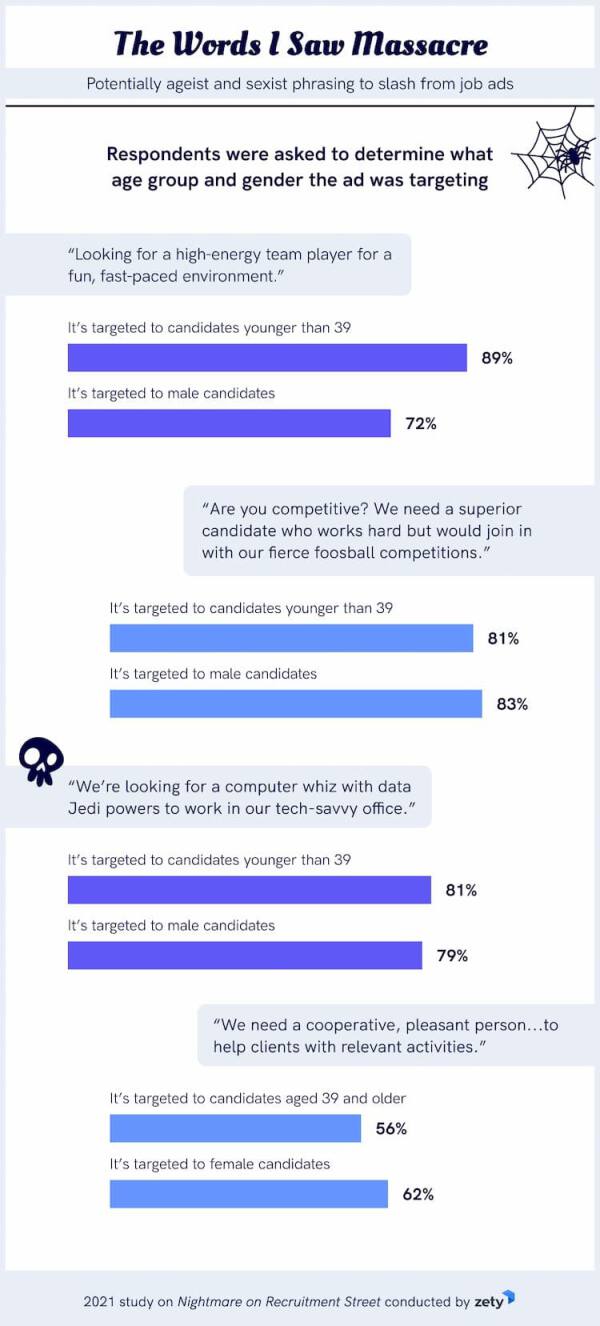
Tasks, application forms, and chatbots—Oh my!
Unfortunately, our study participants had dealt with some annoying recruitment humdingers.
Chatbots may have cute smiley faces, but let’s face it: they’re AI and they’re evil. Okay, that’s an exaggeration, but they definitely aren’t welcome by more than half of those in our study.
- 56% said dealing with a chatbot was annoying.
And tasks. Sigh. As if you didn’t have enough on your plate.
From an employer’s perspective, it’s a way of digging deeper than the words on a resume. They can see if you’ve got the stuff, or not. But, it’s understandable that for a job seeker applying to many places, adding a task is a bit of a turn-off.
You’re thinking, “Don’t my work history and qualifications speak for themselves? That’s why a large percentage of the respondents found tasks bothersome.
- 39% said having to complete a task for a job application was annoying.
Whether it’s not hearing from your Tinder date or getting no response after an interview, getting ghosted is just...wrong.
That’s why 69% said that two weeks going by and not hearing anything from the recruiter or hiring manager post-interview was annoying.
And, talk about unprofessional.
- 60% had dealt with a recruiter calling them while they were at work.
- 64% said a recruiter had demanded a quick response from them to set up an interview
- A shocking 87% had experienced not getting any reply after submitting an application.
It seems that employers should step up their game during The Great Resignation. Those in our survey showed they’re discerning and want more transparency in their job ads. And, they had dealt with far too many disappointing recruitment situations.
Wrapping up
From job ads to the first contact job seekers have with recruiters. Everything counts.
This survey showed that the wording in job ads is critical to attracting or repelling candidates. Our survey-takers had far too many negative experiences with recruiters, who should be on top of their game at this time.
There should be no reason to use ageist or sexist language in job ads.
About salary transparency...
If you’re an employer, we know—pay transparency can be a double-edged sword. Just weigh the pros and cons before including a salary range in your job posts. And be aware that if you don’t, you might lose out on candidates to employers who do publish it.
The main positives:
- Candidates know instantly whether the job is financially viable for them.
- Candidates want to know what the remuneration is. Sharing it gains respect.
- It streamlines the conversation later since candidates know what to expect.
Lastly—
Job seekers are becoming more selective in their job searches as the labor market tightens. It’s best to make job ads and recruitment processes as attractive as possible.
Methodology
We surveyed 1054 respondents online via a bespoke polling tool on their opinions on wording in job ads and recruiter experiences. All respondents included in the study passed an attention-check question. The study was created through several steps of research, crowdsourcing, and surveying.
Limitations
The data we are presenting relies on self-reports from respondents. Each person who took our survey read and responded to each question without any research administration or interference. There are many potential issues with self-reported data like selective memory, telescoping, attribution, or exaggeration.
Some questions and responses have been rephrased or condensed for clarity and ease of understanding for readers. In some cases, the percentages presented may not add up to 100 percent; depending on the case, this can be due to rounding, or due to being part of a larger statistic, or due to responses of “neither/uncertain/unknown” not being presented.
Fair use statement
Don't miss the chance to share these findings—–you might regret it! If you think your audience will be interested in this information, you can share it for noncommercial reuse. All we ask in return is that you link back to this page so that your readers can view the full study.
Sources
- Button, P., Munguia Corella, L., Neumark, D., “Older Workers Need Not Apply? Ageist Language in Job Ads and Age Discrimination in Hiring”
- Gaucher, D., Friesen, J., Kay, A., “Evidence That Gendered Wording in Job Advertisements Exists and Sustains Gender Inequality”
- Hodel, L., Sczesny, S., von Stockhausen, L., Formanowicz, M. and Valdrová, J., “Gender-Fair Language in Job Advertisements”
- Lewis, G., “This Job Description Heatmap Shows You What Candidates Really Care About (and What They Ignore)”
- Mikić, J., Kanjuo Mrčela, A., Kalin, M., “Gendered and ‘Ageed’ Language and Power Inequalities: An Intersectional Approach”
- Neumark, D. Burn, I., Button, P., “Age Discrimination and Hiring of Older Workers”
- Payscale “2021 Compensation Best Practices Report”
- Society for Human Resource Management, “More Employers Post Salary Ranges to Attract Workers”
- Verwaeren, B., Van Hoyem, G., Baeten, X., “Getting Bang for Your Buck: The Specificity of Compensation and Benefits Information in Job Advertisements”
About Us
Zety’s career blog not only provides tips on writing ATS-friendly resumes and career change resumes but also offers job interview tips and thank-you email templates to send after the interview.
About Zety’s Editorial Process
This article has been reviewed by our editorial team to make sure it follows Zety's editorial guidelines. We’re committed to sharing our expertise and giving you trustworthy career advice tailored to your needs. High-quality content is what brings over 40 million readers to our site every year. But we don't stop there. Our team conducts original research to understand the job market better, and we pride ourselves on being quoted by top universities and prime media outlets from around the world.
Sources
- https://www.cpip.uci.edu/files/docs/neumark_ageist_jobs_ads.pdf
- https://psycnet.apa.org/record/2017-18731-008
- https://pdfs.semanticscholar.org/84e6/bfbf2924ac179c461cfbf1e3ee7d2616375f.pdf?_ga=2.259740169.2011040415.1638141800-517296558.1637670887
- https://www.frbsf.org/economic-research/publications/economic-letter/2017/february/age-discrimination-and-hiring-older-workers/
- https://www.shrm.org/resourcesandtools/hr-topics/talent-acquisition/pages/salary-ranges-.aspx
